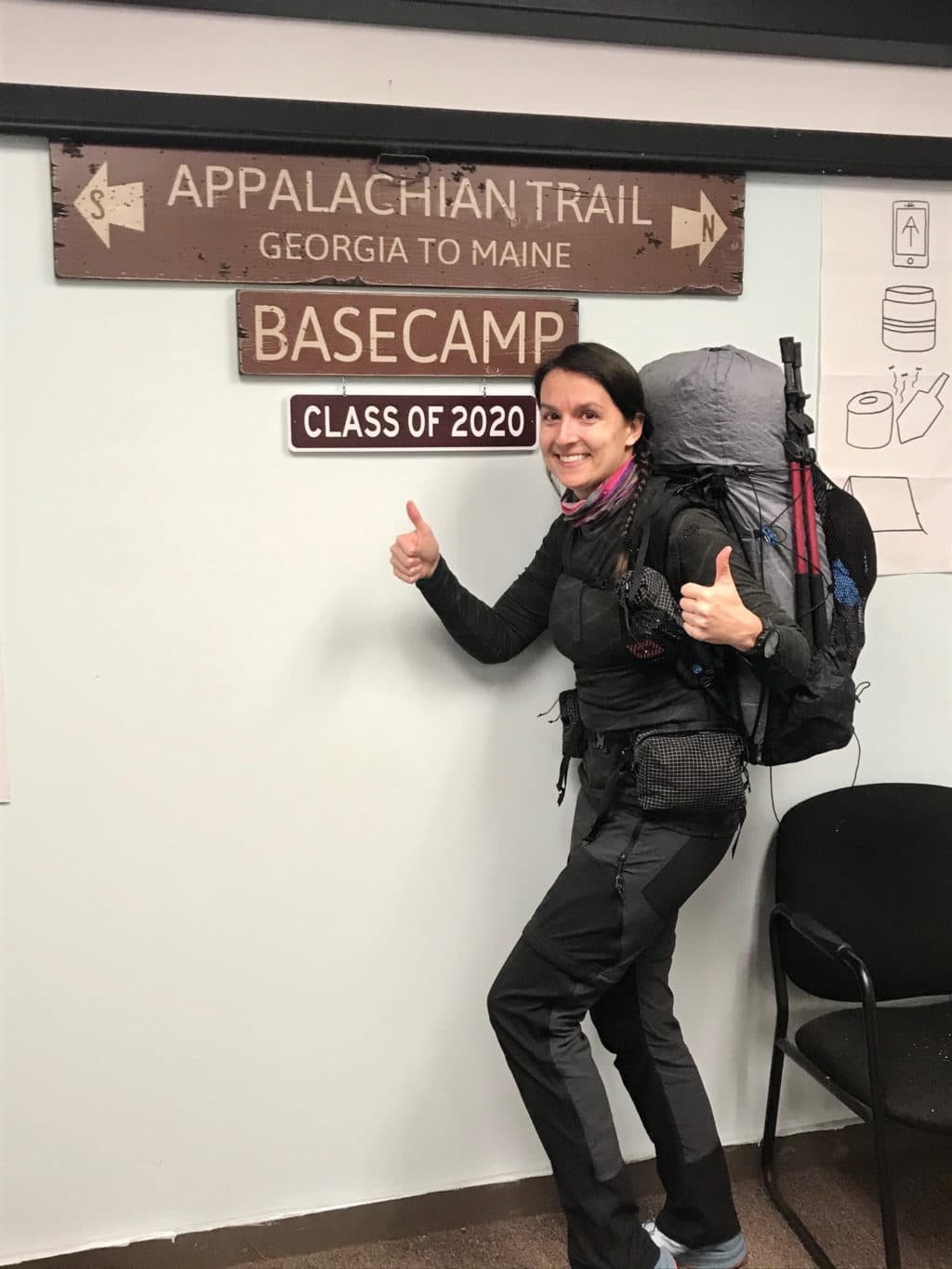Holding Back the A.T. Class of 2020
Gear carefully selected and tested, resupply boxes packed and addressed, training miles covered to condition the body, negotiating a leave of absence work or resigning entirely—preparing to thru-hike the Appalachian Trail comes with a sizable and complex to-do list. Many people spend years finding the right time to pause regular responsibilities and prepare for the physical and logistical challenge of walking more than 2,000 miles with a backpack and a dream.
The Class of 2020 started strong. By March 20, 1,367 thru-hikers had registered at Amicalola Falls, the approach trail in Georgia that leads to the beginning of the A.T., a seven percent increase from that date one year earlier. While those hikers were settling into their journey, preoccupied with mileage and nourishment, excited and nervous for the path ahead, the coronavirus was also on the move.
By that time, the Appalachian Trail Conservancy (ATC) had convened a task force of representatives from public land management agencies, volunteer clubs, and other stakeholders. They sent three emails in the last two weeks of March, first asking long-distance hikers to postpone their thru-hikes, then asking all hikers to stay off the trail, and finally stating that thru-hikers who continued would not be recognized in the class of 2020.
“We had to face the reality of the disease,” said Sandra Marra, president & CEO of the ATC. “The median age of our volunteer base is 65 to 70. They are in the sweet spot of highest risk groups.” Hikers could be “walking infectors and going into small communities could have led to serious infection.”
Thru-hiker Carl McDonald, a long-distance cyclist who has completed numerous tours including one from Anacortes, Washington, to Bar Harbor, Maine, started the A.T. on February 25, after spending months covering 800 miles on trails near his Florida home. On his way to Hot Springs, N.C., in mid-March, McDonald met hikers recounting “all kinds of doom and gloom about what we could expect in Hot Springs—restaurants closed, laundromats closed, hotels closed.”
But when McDonald arrived in Hot Springs around March 20, that was not the case. He stayed overnight, did laundry, resupplied, and spoke to his concerned sister in Florida, who had already started driving north, intent on picking him up. They agreed he would continue on and check in with her when he got to Erwin, Tenn., five days later. “In the timber, we were not aware of how serious things were. But when [the ATC] said get off the trail, that was enough for me.” He left the trail with almost 350 miles behind him.

Catherine Turgy, who lives in Montreal, Canada, also heeded the call. She was 109 miles into her thru-hike when she left the trail and flew home via the eerily empty Atlanta airport. “I was shocked to see the airport empty. I thought maybe I was in the wrong terminal, that they were doing renovations.” At customs, when Turgy explained where she’d been and why she was traveling to Canada, the agent felt so bad for her she wanted to give Turgy a hug but couldn’t because of the virus.
The pandemic stopped Jim MacKay’s thru-hike before it even began. MacKay had given notice at his job, which ended March 12, and had his gear packed and by the door, ready for a March 27 departure that never came. “The universal feeling is disappointment. I feel for everybody in the class of 2020 that wanted to go and didn’t.” MacKay said with trail towns closed and no shuttles, the possibility of resupply seemed impossible, not to mention the community impact. “I didn’t feel like I could possibly justify spreading this disease to Appalachian towns. Hell, they don’t even have healthcare to start with, let alone healthcare to take care of this.”
But not everybody stayed off the trail. “The thru-hikers didn’t totally stop,” said Mike Hill, commissioner of Carter County, Tennessee, which includes Roan Mountain, a town that calls itself Tennessee’s outdoor playground. “Many continued even though there was the directive to come off the trail, because thru-hikers are rebel hellions.” Where permitted by state regulations, some local businesses chose to stay open, trying to provide safe service to those continuing on. Roan Mountain’s new tourism slogan, “We’ll see ya when you get here!”, reflects the town’s desire, Hill said, to continue to welcome visitors seeking outdoor recreation. “We’ve got all the room in the world to social distance.”
Carl McDonald is frustrated by the hikers who continued. “I think it’s spectacularly selfish behavior to put yourself above others and stay on the trail.” But he struggles with his own reaction and the divisiveness that has emerged. “It breaks my heart, because the hiking community is generally the most cooperative group I’ve ever encountered. On the trail everybody is equal. Hikers are famous for having a terrific sense of community. But now there is a huge schism.” His own judgment of those who chose to stay on the trail, McDonald said, violates one of the main mantras of the A.T., hike your own hike, which encourages hikers to acknowledge that everybody’s journey is different and others’ choices deserve respect rather than judgment. Still, he doesn’t abide those who disregarded the greater good in favor of their own agenda and draws a parallel to the current reckoning with racism, saying that hikers who continued on “need to check their privilege. I can’t help but guess that people of color would never be able to get away with what these hikers are doing by defying orders and sneaking around law enforcement on closed trails.”

Maybe Next Year
The pandemic has destroyed our best laid plans and challenged us to come up with new ways to persist and deal with continuing disappointment. When it comes to the life-changing experience of thru-hiking the Appalachian Trail, it’s hard to let the dream die. Some aspiring A.T. hikers haven’t given up on 2020. Between July 1, when Baxter State Park, home of Mt. Katahdin, re-opened and July 17, 72 thru-hikers began southbound journeys, taking their chances on a late-start thru-hike whose last few months will surely be filled with challenging winter conditions.
Those who stayed behind are weighing 2021. The ATC said they would certify 2020 hikers who exited the trail this year before March 31 and returned to complete it once it was safe to do so, even if that time is next year. After hearing that, McDonald knew he would go back. “Provided the trail opens next spring, on March 25, the same day I walked off, I intend to step back on at Erwin Tennessee and continue that journey north. That saves me a month of winter and some brutal hills and mountains that I’ve already paid dues for.”
Others aren’t so sure. Back in Canada, Turgy, who’s been captivated with the trail ever since she met a woman thru-hiking solo in New Hampshire’s White Mountain, held hope through the spring that the borders would reopen and she could return to the U.S. to resume her hike. But in late May, when the Canadian government extended the border closure another month, she realized that her A.T. thru-hike would not happen this season and decided instead to hike the Quebec National Trail. She remains unsure of her plans for next year.
“As much as I loved the A.T. and the people and the experience, I fear that 2021 will be overcrowded. If it’s overcrowded, you don’t want to be one of the humans among 60 at the tent site. It’s gross, and it destroys the trail.” She is considering the Pacific Crest Trail, which limits the number of hikers, or possibly a less-crowded southbound A.T. thru-hike.
For MacKay, a helicopter pilot who became fascinated with the trail over two decades ago when he was in college, it’s taken time to work past his initial frustration. “After the 100th person told me ‘the trail will be there next year,’ I wanted to punch them,” said MacKay, who has found contract work for the next several months. His wife encouraged him “to be authentic to his goal,” and he hopes to find a few good days of weather toward the end of March 2021 to set off again—if it’s safe to do so. “My biggest fear right now is that next March nothing looks substantially different. None of us know what the world will look like in 8 months.”








